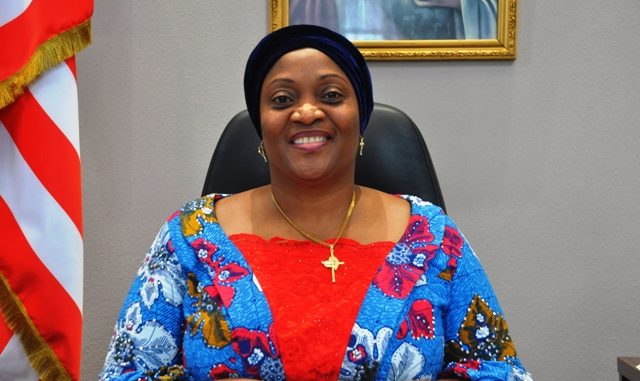Vice President of Liberia, Dr Jewel Howard-Taylor, has said war should never be an option for change in national leadership.
She stated this at the ground breaking ceremony of the Armed Forces PTSD Centre in Abuja.
Howard-Taylor who recounted Liberia’s ordeals in its civil war and Nigeria’s contribution to stabilize the country said war should never be an option despite grievances.
She hoped that the PTSD centre, becomes a centre for all of Africa and ‘will provide a safe place for armed forces to get the care that they need so that they can return the local state to their families’.
“Let me briefly touch on the story of the Nigerian soldiers who participated in international peacekeeping in Liberia. Of which our honoured general was among. I am glad that this subject is now one for the history lesson and carries it with a simple truism that no matter what, war should never be an option for change in national leadership or change, we say no to war.”
She said the war started as internal crisis but later had ripple effects on other countries including Nigeria.
“On the one hand, our crisis that began as a small crisis in our country plunged the international community into many challenges. There was a huge number of refugees scattered all over in our region, including here in Nigeria. International community, including Nigeria, have to put their thinking caps on and mobilize resources to deal with complex humanitarian emergencies. Whilst on the other hand, they caused death, separation of families, lack of basic needs of survival, the alienation of local communities where refugees were temporarily.
“Thankfully, in response to this crisis, regional leaders under the aegis of the Economic Community of West African States, after much deliberation, decided that peacekeeping and military intervention was the best option to halt the civil war. This then prompted the deployment of ECOMOG with intent to stop the war.
“The intervention by ECOMOG, with a vanguard growth being played by Nigeria, was the first comprehensive attempt at regional peacekeeping since the African forces 1960 -1965.
“Because of this devastating effect of the war, coupled with the security threat of force throughout the region, all of Africa was affected. Usually deployed with about 3000 West African troops under the leadership of the Federal Republic of Nigeria. By 1995 two sides increased by 8500, or about 50%, which were Nigerian soldiers.
“I’m happy to know that beyond the military intervention, ECOWAS, under the strong leadership of the Federal Republic of Nigeria, went beyond its normal focus of regional integration and peace to facilitate many diplomatic meetings to proffer solutions for some crisis from 1989 to 1996. As a result of the sacrifices made by the regional forces, thankfully in 1995, the Abuja peace accord was signed chaired by General Sani Abacha,” she said.
We’ve got the edge. Get real-time reports, breaking scoops, and exclusive angles delivered straight to your phone. Don’t settle for stale news. Join LEADERSHIP NEWS on WhatsApp for 24/7 updates →
Join Our WhatsApp Channel










